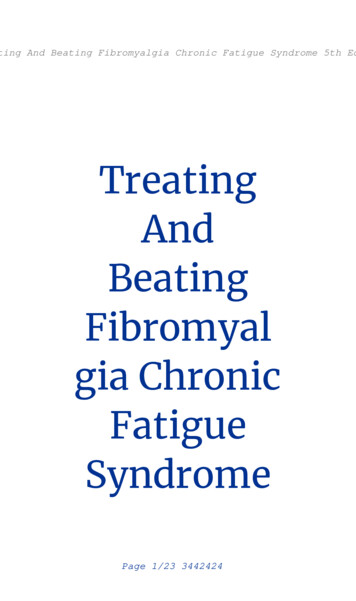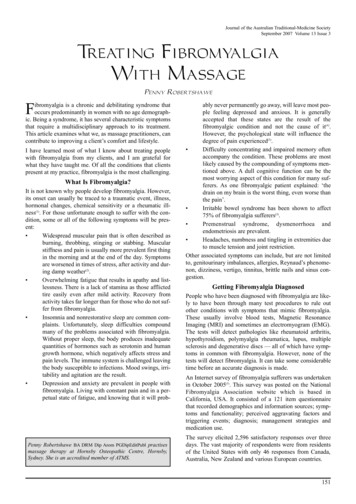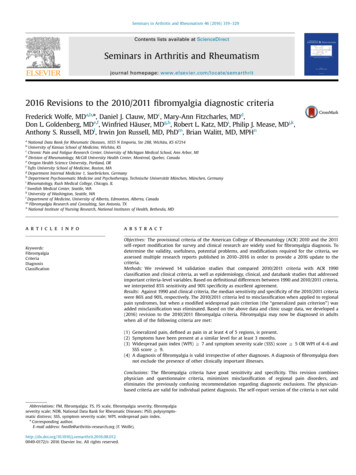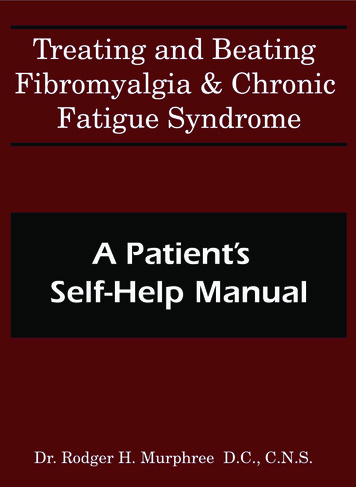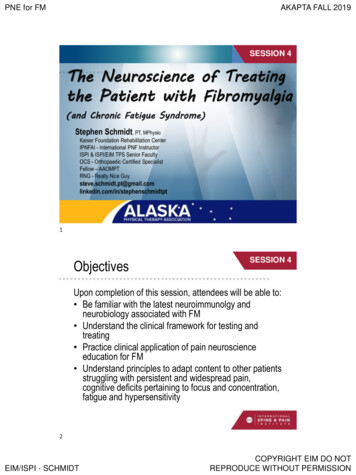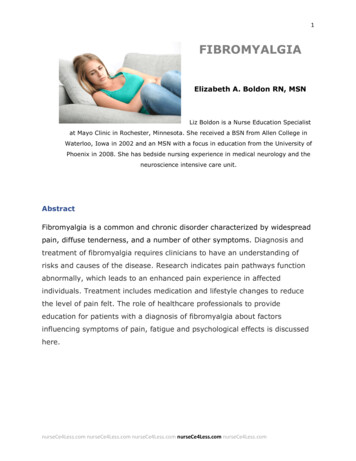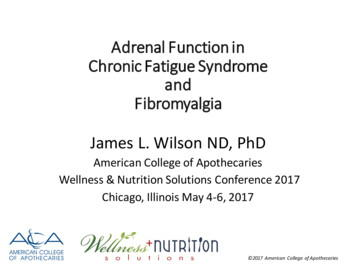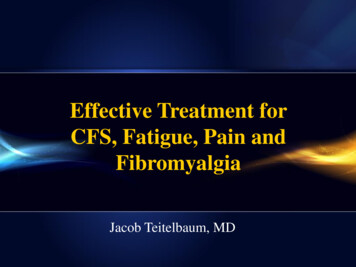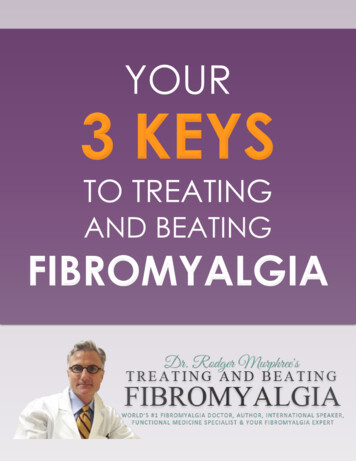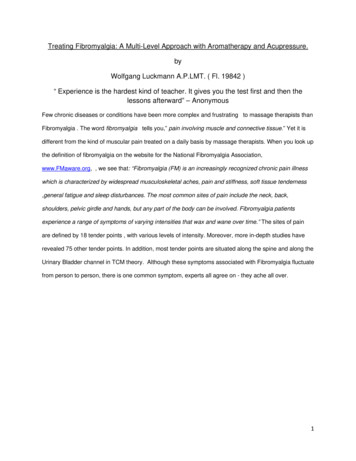
Transcription
Treating Fibromyalgia: A Multi-Level Approach with Aromatherapy and Acupressure.byWolfgang Luckmann A.P.LMT. ( Fl. 19842 )“ Experience is the hardest kind of teacher. It gives you the test first and then thelessons afterward” – AnonymousFew chronic diseases or conditions have been more complex and frustrating to massage therapists thanFibromyalgia . The word fibromyalgia tells you,” pain involving muscle and connective tissue.” Yet it isdifferent from the kind of muscular pain treated on a daily basis by massage therapists. When you look upthe definition of fibromyalgia on the website for the National Fibromyalgia Association,www.FMaware.org, , we see that: “Fibromyalgia (FM) is an increasingly recognized chronic pain illnesswhich is characterized by widespread musculoskeletal aches, pain and stiffness, soft tissue tenderness,general fatigue and sleep disturbances. The most common sites of pain include the neck, back,shoulders, pelvic girdle and hands, but any part of the body can be involved. Fibromyalgia patientsexperience a range of symptoms of varying intensities that wax and wane over time.” The sites of painare defined by 18 tender points , with various levels of intensity. Moreover, more in-depth studies haverevealed 75 other tender points. In addition, most tender points are situated along the spine and along theUrinary Bladder channel in TCM theory. Although these symptoms associated with Fibromyalgia fluctuatefrom person to person, there is one common symptom, experts all agree on - they ache all over.1
Location of tender points on the Urinary Bladder channel with acupressure treatment. Notice the colourcoding for the intensity of pain.In addition, there is a cluster of other seemingly unrelated pathologies and signs and symptoms thatpoint at systemic involvement in the patient. The most important pathologies and conditions are, and thisis listed randomly: Adrenal insufficiency , brain fog, Irritable Bowel Symptoms , edema of the extremities, endometriosis ,painful menstruation, PMS., food sensitivities, sugar cravings, hypertension, tensionheadaches, migraines, obesity, insomnia , candida, depression, fatigue, allergies, hypo-thyroidism,osteoarthritis, vaginal infections ,Raynaud’s Syndrome. These are just the most important pathologiesand conditions. Again , these pathologies and signs and symptoms will vary from person to person.When faced by this multitude of pathologies and conditions, the massage therapist might well feeloverwhelmed , as so much is really outside the scope of practice of massage therapy . Furthermore,training in bodywork in most massage therapy schools tends to be Western orientated , which is based onclinical and medical massage of the body’s myofascial system. The holistic connection of mind , body2
and spirit is seldom addressed directly in treatments and is more often glossed over. . The emphasis inWestern medical massage tends to be neuromuscular, coupled with various forms of stretches,hydrotherapy and myofascial release .When combined together, these modalities are very effective in treating the various signs and symptomsof pain, limited R.O.M. and ischemic trigger points. In addition, circulation and lymphatic drainage isenhanced , scarring and adhesions are decreased. From the benefits derived from this multi-disciplinaryapproach alone, it is clear that a multi-disciplinary approach in treating Fibromyalgia, will obtainimprovements in patients with severe manifestations of fibromyalgia. The severe manifestations tend tobe centered on the issues of pain and energy. The question remains though, is this enough? Otherquestions remain unanswered like, does the Western approach get to the causes and not just thesymptoms of Fibromyalgia ? Also, can the benefits be accelerated by addressing the mind and spirit ofthe patient first in a more holistic approach?To answer these questions, the therapist needs to apply aromatherapy first and then acupressure.Let’s look at how aromatherapy works. Aromatherapy, works quicker than bodywork, through the senseof smell. Odor molecules affect our brain chemistry by targeting the limbic system. Sometimes also calledthe leopard part of the brain because it is mainly associated with the sympathetic nervous system andtherefore “Fight or Flight” syndrome. The limbic system affects learning, emotions and memories , as wellas appetite and sexuality. Once the odor molecules stimuli affect the limbic system, neurotransmitters,including endorphins are released which reduce pain; encephaline, which promotes pleasant feelings;and serotonin, which causes a calm feeling and relaxed state as well as uplifting depression.Furthermore, the sense of smell affects the hypothalamus , which controls the body’s neurochemical andhormonal regulation. This part of the brain also communicates with the sex glands, frontal lobes, whichcontrol attention and memory; and the reticular system, which brings together the body and mind.3
Diagram showing the location of the three levels of thinking in humansWhen we compare the effects of aromatherapy with the major pathologies and conditions in Fibromyalgia,we can see clearly how comprehensive and deep the benefits are. First and foremost all signs andsymptoms associated with pain are addressed on a multi-level approach. Studies , for example, haverevealed that lavender increases alpha waves in the brain associated with the effect of relaxation. Alphabrain waves are predominant when the mind and body are relaxed. Those who practice meditation4
regularly for relaxation in whatever form will have experienced alpha waves Yet. the effects of lavenderdo not stop there.Fibromyalgia patients also experience stress-related symptoms, like insomnia, anxiety, anger, irritabilityand hypertension. Lavender also induces the production of serotonin , which contributes to happiness,relaxation and the ability to get a good night’s sleep.Lavender should be used first to facilitate the reception of other oils by the limbic and various othersystems of the body. The effects of lavender are also enhanced when you mix lavender with marjoramand Neroli. These oils as a group are also known as sedatives.Other studies have shown that the lack of serotonin is associated with depression , anti-social behaviorand hyperactivity in children. Then there are scents like rose and clary sage that free emotional blockagescaused by anger, irritability and anxiety, through the stimulation of enkephalins. These aromas also helpto fight depression and moodiness . One cannot help notice , therefore, how single and blended oilscause numerous neuro-chemical changes and a whole cluster of emotional effects associated with suchchanges.Attention should be given first to treating the mind in Fibromyalgia patients. According to medical doctors,Fibromyalgia is principally and generally caused by stress. Often, Fibromyalgia is caused by acombination of shock and trauma. In keeping with the philosophy of Traditional Chinese Medicine , allailments are essentially a disturbance of the spirit. Accordingly, it is the spirit that heals the disease.Therefore aromatherapy should not be simply seen as a “ somatic “ medicine.On the other hand, when targeting somatic conditions like myofascial pain and inflammation, SpikeLavender can be mixed with Peppermint, Helychrysum, Clove, Thyme Linalool mixed in St John’s Wortcarrier oilA major benefit of using , aromatherapy , is that it works in a non-confrontational manner. This can be anissue with Fibromyalgia patients , especially on their so-called “bad days” , when any kind of bodywork5
seems contra-indicated. The therapist can first use a combination of lavender and Roman chamomile fortheir relaxing and sedating effects. Clary Sage and Cypress can be used for their anti-spasmodic effects ,while rose and Ylang Ylang , or Clary Sage again can lift the mood of depression.Again, focusing on the mind without being non-confrontational the therapist then includes an acupressuretreatment on several strategic channels and acupressure points. Since there are several points that havemultiple benefits and major functions , the number of points can be limited to a small number withouthaving to treat the whole body in a kind of shotgun effort. .This would be in keeping with an important TCM principle of treatment where many diseases can betreated with one protocol . We have seen above that Fibromyalgia is a syndrome , so it makes sense toselect the acupressure points that cover multiple benefits in order of importance. In addition , theessential oils themselves can also be applied directly on such points to enhance the effects.Application of a calming essential oil like Ylang Ylang on Governor Vessel 20 for calming the mind6
What would then be a good overall protocol that combines acupressure with essential oils? The strategyshould one of moving from the general to the specific. As in aromatherapy, the general focus would referto the mind and the specific to more somatic points of discomfort.The therapist should start with the Governor Vessel points on top of the skull. The Governor vesselgoverns the Qi and stagnation or blockage of Qi impedes the flow of blood and lymph creating pain , lackof energy, chronic emotional toxicity, memory loss and numerous other things.A crucial point would be Governor Vessel 20 . According to “ The Systematic Classic of Acupuncture andMoxibustion “ a pre-modern classic of contemporary acupuncture , ( see “ Chinese Medicine “ – deMourant , George – Paradigm Publications, Brookline, Massachussetts – 2004 ) this point is mainlyresponsible for mental alertness, concentration, memory, energy. TCM therapists also use it for getting ridof headaches, general pain, stress and achieving overall balance of the mind. Typical Fibromyalgiapatients will lack mental alertness, memory, energy , concentration. In addition they will suffer generaland specific pain as in headaches All of these attributes and signs and symptoms will be present to agreater or lesser degree.The therapist will first apply one drop of an essential oil like Ylang Ylang , or, Geranium ,or Lavender androtate her thumb in a counter-clockwise rotation on that point with gentle pressure. Rotating your fingercounter-clockwise calms, centers and grounds the patient. The pressure applied should be minimal. On ascale of 1 – 10. Where 10 represents extreme pressure and 1 minimal pressure ( or the weight of aquarter coin ), then 1 - 2 is appropriate. From now on , any mention of “minimal acupressure “ in thearticle shall mean pressure on a scale of 1 -2/10. The duration of the treatment on each acupressurepoint should be a minute or more or until the pain is reduced substantially. Care should be taken, not tospend too much time with a stubborn pain area but move on, as all areas are interlinked by channels.Removing stagnation of qi in any part of the channel will allow the qi to flow along the whole channelmuch easier. It’s like removing a dam of debris of obstacles on a stream.Acupressure is all about connecting energetically and not trying to force any pain away by beingconfrontational.7
A good follow-up is to perform acupressure down the mid - sagittal line on the head of the patient wherethe pathway of the Governor Vessel is located. Pressure should be minimal again and the therapist canlinger on points for three to four seconds. The therapist starts on the hairline in front and finishes justbelow the position of Governor Vessel point 20, or just below the apex of the head. This procedure shouldbe repeated 10 X. Treating these points on the head is also a good way to address insomniasuccessfully according to standard textbooks of TCM bodywork ( Chinese Bodywork – A CompleteManual of Therapeutic Massage – Sung Chengmen – Pacific View Press, Berkeley, California – 1995 )Acupressure down the Governor Vessel for insomnia and calming the mind and groundingNext , the therapist should treat Liver 3 on top of the foot. A calming essential oil like Lavender , or any ofthe aforementioned oils should be used. The therapist can also use several oils on one acupressure point8
in layers. First the essential oil is rubbed in counterclockwise until it is absorbed. Good oils only takeseconds to be absorbed through the skin.This is an extremely important point , since in myofascial pain issues, it releases pain and tension in thetendons in the body and tension related headaches. In addition, this point is always used in treatingmigraine headaches as well. On an emotional level, it disperses anger and lifts up depression. From agynecological viewpoint, it helps release PMS. and painful menstruation. The therapist first holds thesepoints for 5 seconds with minimal pressure. Then he or she rotates each finger counterclockwise for 19seconds each.Acupressure on Liver 3 for myofascial , pain , headaches, PMS. and much more.9
Those who do Chakra balancing and Polarity therapy, will have noticed how we have moved from oneopposite pole to the next.Only now should the therapist do specific acupressure on painful sites. The Urinary bladder Channel nowcomes to mind as most tender points are situated on or near it in Fibromyalgia patients. Acupressure isperformed down the entire Urinary Bladder channel with both thumbs next to one another at least 10 X.Initial pressure on the first sweep down is minimal with each sweep down increasing to 4 - 5 / 10 . Thetherapist should linger on specific tender points for up to ten seconds or more and then move on. Then heor she should rotate on that point in a counterclockwise fashion with minimal pressure.Acupressure down the Urinary Bladder channel for myofascial back pain. Colour coding can be appliedto mark pain intensity.10
Finally , areas of the body can be targeted sequentially which are hurting most at the time of the patient’svisit. It should be mentioned that Fibromyalgia patients always have specific areas that hurt most at anygiven time on top of being sore all the time. Speculation is rife about the reasons for this phenomenon.Some doctors state that this can be weather-related ; or caused by muscle-strain, psychological orphysical trauma; or depression, anger and so on. A practical reason for focusing primarily on thatparticular problematic area as opposed to doing a general overall treatment is time. A massage therapysessions generally lasts mostly an hour or an hour and a half. Also the patient may not have the staminato endure a full hour of general massage or acupressure.The therapist locates the area, which may or may not be near a classical acupressure point . The classicTCM text “ The Yellow Emperor’s Guide to Internal Diseases” states that “ wherever there is pain, thereis an acupuncture point.” Then, he or she applies a calming oil and follows up with acupressure . Theprotocol is exactly like the one performed on the head and spine, with the exception that it is done onceand only repeated 2 x as a follow up, after first moving on to other sites and then only returning to the firstsites to check up.11
Acupressure on the anterior deltoid near Large Intestine 15 , a classic tender point in Fibromyalgiapatients.After dealing with myofascial pain and mental stress , what remains , are the issues of constant fatigueand depression. In TCM , lack of motivational energy, depression is caused by insufficient qi not movingthe blood and lymph. The insufficient Qi could have been caused partially by pain and trigger points thatare the result of blocked or congested Qi. Now the therapist has to proceed from the narrow focus oftreating the patient specifically for pain syndromes to the more general emphasis of boosting overall Qiand blood and lymph flow. For this, acupressure points and channels that tonify and strengthen organs,need to be treated.A good formula would be a combination of Kidney 1, 3 with Spleen 6 and Stomach 36 bilaterally . This isfollowed by Large Intestine 4. Finally , Governor Vessel 20 should be treated by rotating the thumb12
clockwise now for more energy, focus and strengthening of all organs. The duration of treatment shouldbe a minute each on these points.Essential oils for energy can be: Peppermint, Black Pepper, Lemon which can be used individually on theacupressure points . Ginger and Cinnamon are optional, but together can be too warming forFibromyalgia patients. The therapist should use one drop each per point and rub them in clockwise . Thistreatment should only follow after the initial use of calming oils.13
Acupressure on Spleen 6 and Kidney 3 ( marked by the yellow dot ) for more Qi and blood flowThere is one major reason why acupressure should be used prior to an overall Swedish massage orinstead of a full body massage. There is now a huge body of scientific evidence ( see among others,Plain Talk about Acupuncture – Mitchell E. – Whitehall – New York – 1997, Trick or Treatment: AlternativeMedicine on Trial – Singh, Ernst – Bantam Books – London – 2001 ) ) that proves that acupressure oracupuncture taps into the endocrine system and releases endorphins, enkephalins , dopamine , serotoninand other hormones that among other things, act as natural opiates, stabilize mood , lift depression,increase focus and overall well-being . In retrospect then, acupressure also repeats the effects ofaromatherapy and therefore augments the overall treatment effect on the Fibromyalgia patient.In conclusion, the use of non-confrontational therapies like aromatherapy and acupressure together,create a deep and lasting effect on the Fibromyalgia patient. There are two main reasons for this . Firstfrom a TCM viewpoint , the universal life force of qi is unblocked and strengthened resulting inharmonious and balanced energy flow. Without sufficient qi, there is no blood and lymph flow. The mindand spirit is thus calmed. Secondly , from a Western physiological viewpoint, both the central nervoussystem and endocrine system are in a manner of speaking, ”switched” over from a sympathetic, fight orflight mode ( originating in the limbic part of the brain ) to a parasympathetic or calm mode. This deepand lasting effect is therefore caused by re-establishing the holistic body-mind- spirit connection in theFibromyalgia patient.REFERENCES:1. Myofascial Pain and Dysfunction – Simon Dave and Travell, Jennifer – Williams and Wilkins –Baltimore, Md. – 198314
2. The Illustrated Encyclopedia of Essential Oils – Lawless, Julia – Barnes & Noble Books – NewYork – 19933. Chinese Bodywork – A complete Manual of therapeutic Massage – Sung Chengnan – PacificView Press, Berkeley, California – 19954. Trick or Treatment: Alternative Medicine on Trial – Singh, Ernst – Bantam Books – London –20015. Chinese Medicine – de Mourant, George – Paradigm Punlocations, brooline, Massachussetts –20046. Aromatherapy for Bodyworkers – Shutes, Jade, Weaver Christina – Prentice Hall Health – UpperSaddle River, New Jersey – 2007BIOGRAPHYOriginallly educated in South Africa as a high school teacher, Wolfgang changed careers completely tobecome an acupuncture physician and massage therapist in the States. Wolfgang Luckmann graduatedfrom the Florida College of Natural Health in 1995 and the College of Acupuncture and Massage in Miamiwith Summa Cum Laude. From 1997 till 2002 , he has been teaching massage therapy for state licensingpurposes at various colleges in Miami and Jacksonville, Florida. At present, he is mainly engaged inteaching continuing education courses throughout the country. He is also presently practicing part-time inFernandina Beach and Jacksonville ,Florida .15
the definition of fibromyalgia on the website for the National Fibromyalgia Association, www.FMaware.org, , we see that: "Fibromyalgia (FM) is an increasingly recognized chronic pain illness which is characterized by widespread musculoskeletal aches, pain and stiffness, soft tissue tenderness ,general fatigue and sleep disturbances.
